Batting for India’s Future Leadership Lessons from the Past
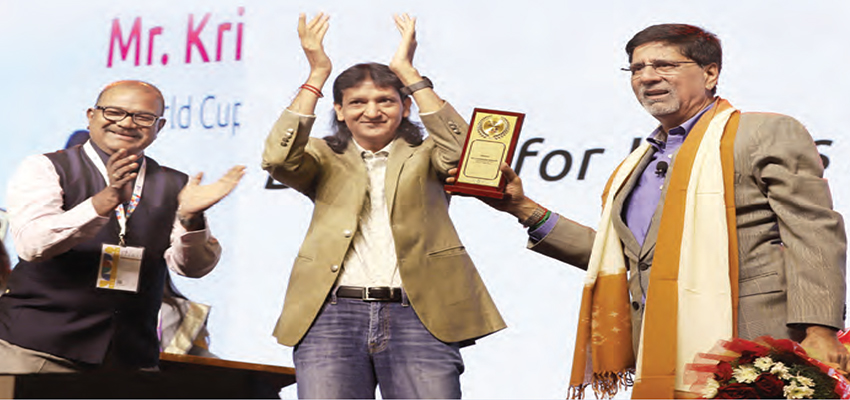
A stylish opening batsman, Krishnamachari (Kris) Srikkanth, known for his aggressive opening style was a hurricane on the field. His attacking nature was clearly evident during the 1983 World Cup finals against West Indies, as he top-scored for the Indians. An energetic motivational speaker and entrepreneur, the 1983 World Cup winning cricket legend, Kris Srikkanth captivated the audience with his powerful session, at the recently held, 25th NHRD National Conference, at HICC Novotel in Hyderabad. Corporate Citizen brings you the excerpts from his inspiring talk
Play the game as it comes
Where is the question of decoding the future? Best is play the game as it comes. If you see most of the great Cricket players, like Virat Kohli or Sachin Tendulkar—they and everybody have a basic plan, but they will play as the innings goes by or as the match goes. You cannot just sit, use your computers and say that I will decode the future. Computers are good for giving presentations. People are busy with their computers and say that they have to give a presentation to their boss tomorrow morning. What presentations—these are the jargons, we have to get out of them. Most important in your life, if you want to be successful is what do you want the most in life? Ultimate success—the team winning, your company winning or you wining—that’s all you want and that’s it.
Batting for India’s future need blessings from the past? Yes, I will give you few lessons. But, decode ambiguity—ambiguity is going to be there for all our life, whether you call it recession, this or that. If you take the recent New Zealand vs India one-day matches, in the second match in Lucknow, did you ever expect New Zealand to be all out for 99 runs and India struggling to chase 100 runs, and it took 19.5 overs. Now that is ambiguity, but you will have to play it as per how the wicket behaves, as per what the bowlers are going to do. And, it is same in life.
It’s all about leadership
If you have seen the movie "83", there was total ambiguity. There was no decoding. But, if you are leader or an HR leader, the leader has to motivate. The leader first has to believe that you are going to win, and that is what Kapil Dev did for us in 1983. One man chased it, one man who said we can believe, one man who said that we can win over the mighty West Indies. So, that is the belief that you must instill in your team and motivate everyone in your team, saying that we can do it.
The other thing is, as a leader give ample opportunity to your team to prove themselves. This lesson I learnt when I was the chairman of the selection committee, where again the team won in 2011, when MS Dhoni was the captain. There were so many ambiguous situations. I didn’t go about saying, “If you don’t score you are out.” Never do that. You go down to the level of lowest fellows and say, “I am with you, I am not going to dump you—you tell me how many chances you want.” If you give the confidence, that person will set scoring in the second innings. But, the moment you say, “Four innings and you are out,” how can he go and bat. That’s what happened with Ishan Kishan today, he scores double hundred and now Shubman Gill has taken of like rocket, scoring hundred, double-hundred. But, put yourself in Ishan Kishan’s position—he scores double- hundred, he doesn’t get any stay. Now his future is ambiguous and uncertain, he doesn’t know what to do, he is not able to play his natural game. This is happening since last two weeks, he is not able to play his natural game. So, most important thing is, if you want to get out of decoded future, play your natural game whatever the future is.
"The leader first has to believe that you are going to win, and that is what Kapil Dev did for us in 1983. One man chased it, one man who said we can believe, one man who said that we can win over the mighty West Indies. So, that is the belief that you must instill in your team and motivate everyone in your team, saying that we can do it"
- Kris Srikkanth
Those who have the guts have it
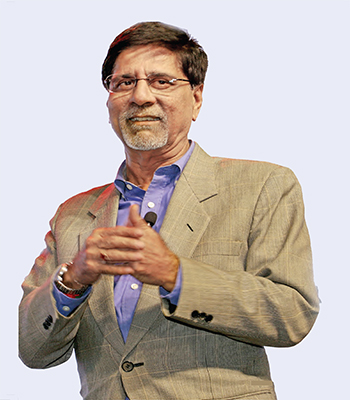 NHRDN dignitaries felicitate Kris Srikkanth
NHRDN dignitaries felicitate Kris Srikkanth
Again a great lesson from 1983 World Cup— 17 for five wickets, captain going in to bat, what does he do? He takes the responsibility. All he says to his partner player is to stay with him for some time, "I will take the responsibility, I will do the job. You just stay with me." That is responsibility. And, what does he do? He hammers the bowling. You need to have that kind of conviction, that you can bring the score from 18/6 to a score of 266/8 on the board. So, you need to have the conviction, courage and belief—ultimately its all about guts. Fortune favours the great–those who have the guts have it. So, you need to be gutsy. In precarious situations—just go there and do it. What did the captain do in 2011 World Cup? You are off on a bad start, Sachin Tendulkar out, Virendra Sehwag out and off course after Gautram Gambhir and Virat Kohli, then suddenly you don’t expect Yuvraj Singh to walk in. MS Dhoni walks in and hammers a brilliant 90 runs and wins the match easily for us. And, he plays effortlessly. Sometimes the captain has to hold the bull by the horns, that’s it.
Enter the unknown space
One thing all the principal motivational and religious books say is, please enter the unknown space. When you go in a known space, you know what’s going to happen and your plan is ready. Go into the unknown space—there is no Excel sheet, computer is not working, there is no plan. When you get into the unknown space, you have to understand one thing—What will I do? How will I handle this kind of difficult situation? How will I handle stressful and precarious situation? The truth is, when you go into the unknown that’s when your creativity comes into being. You have to understand that your own brain is much creative than the computer. Once you start getting into the unknown space, you yourself will find different ways of finding a solution. You will suddenly start playing some extraordinary and outstanding improvised shots. Which shots in our cricket term will be your moves in the business term. You will come with a solution which no one has seen till now. When you go into the unknown space, your talent takes over. And, getting into the unknown space with conviction, you will find a solution and somehow you will do it.
"You need to have the conviction, courage and belief—ultimately its all about guts. Fortune favour the great–those who have the guts have it. So, you need to be gutsy. In precarious situations—just go there and do it"
Taking the opposition by surprise

Most of you here are young and obviously you might not have seen me playing cricket. In those days I would hit over the top, hit towards the long-off, over covers and play all kinds of shots. Many would say, what is this? Who is this playing Ada-Teda (weird) shots? Today the whole world plays Ada-Teda. You see that boy, Suryakumar Yadav, the kind of shots he is manufacturing and hitting over the boundaries. The bowlers don’t know what to do to him. So, what do I do to the opposition and counter the opposition? If you want to counter the opposition, please go see Suryakumar Yadav playing video hundred times a day. If you see one of Suryakumar Yadav’s centuries, he scored against Sri Lanka—he scored one of the best T20 hundreds—you see that video hundred times and you will know how to counter the opposition. Because the opposition should be taken by surprise, you cannot plan, understand that. When the ball is the same but Suryakumar Yadav plays three shots for it, that is taking the opposition by surprise. So, how does it come to him to do this? Because his mind is creative. He is going with an open mind, with no preplanned approach—let me see how it goes, let me take it as it comes.
Follow your deep-rooted desire
Number two is, you need to have tremendous self-belief and conviction in yourself that yes, your improvised way will succeed. Always understand one thing, when you have a deep routed desire and follow your deep routed desire consciously, you are bound to succeed. There is something called subconscious mind, which is connected to the super-computing called God. So, when you have a deep- rooted desire and follow your desire through conviction and consciously, you will achieve whatever you want. And that is what we did and probably Kapil Dev did in the 1983 World Cup. That’s when the team suddenly starts grooming and grouping together—that is when team work comes into play. That is when we start playing as team.
For us India is number one
You must be wondering, Kapil Dev is from North India, he doesn’t know Tamil language. I am South Indian; I don’t know Hindi. And then there are players speaking Marathi, Bengali, Punjabi, Telugu, Kannada. But, how is it that we are able to play as a team? Because, our aim is only one thing, we want our Indian team to win—for us India is number one. When you put your country ahead of your personal performance, you will always do well. That is what I love something about Kapil Dev and Virat Kohli, they put India as number one. That’s why Kapil Dev is what he is and Virat Kohli is what he is. They play for the country— when you start playing for the country, your team will win. That’s why I like even Hardik Pandya’s captaincy, he is able to regroup his young team beautifully.
Focus on strength and not weaknesses
As a leader you should know what everybody’s strength is and what are their weaknesses. Forget his weakness, use his strength. Everybody cannot be strong, everybody has weaknesses. So, set aside the weaknesses and look at the positive. Do the same in your companies. Since you are the HR people, you use the strengths of your people rather than focusing on their weaknesses. Most of us human beings, what we do is we only focus on the weaknesses, on the negative points. We focus on what is wrong rather than what can go right. Your first analysis is what is wrong. So, shift that focus to what is right, then you will see the difference. And you tell the team members, “I am the captain, don’t worry, you are going to play all the four test matches.” A 16-year-old boy, making his debut in 1989 and K Srikkanth is the captain. I only told the 16-year-old boy, “You’re going to play all four test matches, irrespective of whether you score a zero or not." That boy became God of cricket. You know who I am talking about— Sachin Tendulkar—he is God of cricket. You give that confidence, you give that confidence as a chairman, you give that confidence as a captain, you give that confidence as a player, then you will see the difference. That’s what life is all about — confidence.
"A 16-year-old boy, making his debut in 1989 and Kris Srikkanth is the captain. I only told the 16-year- old boy, “You’re going to play all four test matches, irrespective of whether you score a zero or not." That boy became God of cricket. You know who I am talking about—Sachin Tendulkar—he is God of cricket"
Life is all about energy
Self-confidence—if I am able to talk here today, it’s because I have the confidence. Its alright that I will make mistakes. If I say, I am speaking from my heart—I am speaking from my heart. So, whatever you want to do, do it with your heart. I have come here bringing energy—you need energy. Whatever you do, do it with energy.

What is the basic rule of science? Energy can neither be destroyed nor created, it can only be converted and transferred. Which means there has always been eternal energy. How to use that energy to your goal; how you channelise that energy to the right path; because of your energetic nature, how you pass on your energy to your colleagues and team — that matters and that is teamwork for you. That’s’ what about Kapil Dev—he gave us the positive energy, he told us, “We can win, you don’t worry. You just play your game.” So, if you are able to pass on that energy, be it with your family, be it with your friends, be it with your neighbors, office colleagues, try being energetic and you will know the difference in your lives. Because, life is all about energy.
I might be tired, but the moment I pickup a bat, I am energetic. That’s what it should be— you will be tired, you will be zombie, but when you have taken something, do it with full energy, otherwise don’t do anything at all. Energy works in every aspect of our life. Even with cooking food—you cook it with good energy, the food tastes better. So, you have to understand that is what energy can create.
Let the dust settle
So, my dear friends, ambiguity is going to be there all our life, stress is going to be there all our life. I am 63 years old, I have the seen the life cycle’s ups and downs so many times. Stress comes to everybody, in every aspect of your life. For students it comes with studies and it comes to doctors, engineers—you people will be under stress all the time. One way to handle stress or precarious situation or tough situation—don’t participate in the situation, just take a step back and watch. When there is confusion and you don’t know what to do, everything has gone for a sixer, best is don’t do anything and wait for some time. You leave it alone, don’t do anything and watch. What will happen, it will get worse, let it happen. But, once the dust settles down, slowly you will find the solution on your own. You don’t know where the solution is going to come from, but you will find a solution because your deep-rooted desire is to find a solution. That is the constant that will be working in your part of the mind, your deep rooted desire is to find a solution—you will find a solution.
Life is all about Passion
"I don’t believe in immediate solutions. Life is all about passion. The most important is, whatever you do, do it with passion. And if you want to learn about passion, you should learn it from Sachin Tendulkar. That person, for 24 long years, has played cricket— imagine the kind of passion he has got"
Q: What is the secret of you being so energetic?
Kris Srikkanth: I had this energy right from my childhood. I have been an energetic child right from my schooldays and used to play lot of sports—I was a good sportsman. I was a good athlete in school. I didn’t want to be cricketer, but God gave me this and it was all God’s gift. It is God’s way of showing something. Basically, I was a very naughty child. I think, because I was a naughty child, may be that’s why I am more energetic. In fact, in 4th standard, I got a remark on my report card saying “Jumping Jack of the class”. So, now you see where this energy comes from—4th standard onwards.
Q: When you were captain of India Cricket team, how did you empower your team?
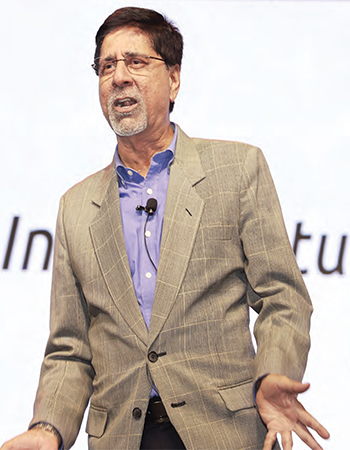
When I took over the captaincy, we had again gone in a very precarious situation in Pakistan. Some of the seniors were not there and we were a very young team. Again, all I had to do is go and motivate all the youngsters, be it Sanjay Manjrekar or Sachin Tendulkar. Off course I had a great person like Kapil Dev to support me. But then I had to go and tell Sachin Tendulkar, “You don’t worry, you are going to play all four test matches, you are going to be the man of future”. Because, don’t forget, Sachin Tendulkar had scored a century on debut in Ranji Trophy, century on debut in Duleep Trophy before that and century on debut in Irani Trophy before that. By the age of sixteen he had achieved all these. So, just have to keep motivating them, saying that you are great, you will do it. You have to keep on talking this to people—you have to go down to that level.
Even Mohammad Azharuddin, after the first two matches, he was struggling. He wanted to give up cricket for sometime and spend time with his family. I told Azharuddin, “Don’t worry, you pray to God and leave it to God’s wish—next match at Faisalabad, in Pakistan, he was dropped on 9th, he was dropped on 51, he was dropped on 75, he scored 109 runs. Next series he took over captaincy from me, that’s all.
So, your job is to just motivate. Your job is to just encourage.
Q: You mentioned to keep aside the weaknesses of your team members and focus on their strengths., but for them to grow and become great leaders isn’t it important to focus also on their weaknesses?
I am not saying don’t focus on the weaknesses. First focus on your strengths, get the best out of them, then you tell them or guide them to correct their weaknesses. Everybody has weaknesses—the problem today in life is that from human beings we have become human doings. Don’t be human doings, be human beings first. Human being will make mistakes, then correct your mistake. If you tell a child every time that you are weak in math’s, the child will get discouraged. But, if you tell the child that you are fantastic in science, you are fantastic in English, the child gets motivated. Then you correct the weaknesses.
By nature I am an energetic person and when I tell others, well done or you are superb, anyone will get motivated and start bowling. So, the whole thing is about what does the person want. So, when you keep the touch, the touch of love, the touch of affection, the touch of care, you will see wonders. Which happens not only with your family, it happens with your team also
Q: We are expected to perform everywhere and every hour.
The problem is, the big bosses sit on cushy chairs and they say, “These are the targets and you have to achieve these targets. If you don’t achieve these targets, you are fired.” The problem is, if at all he says you have to hit three sixes every over, first he has to have hit three sixes every over. The problem is he will not go and lift the bag. The problem is he will come in wearing a tie. I can give target of scoring 220 in 20 overs, but is it possible. There is no chance. Instead, I can say, you try playing 20 overs, we will see how it goes. We will see the run rate after the 10th over and after the 10th over if we cross 100 runs, then we will try for 200. You can’t say, “I need 200 score now, if you don’t get 200, you will be dropped next time.”
Q: We always hear that “Success has many fathers, but failure is an orphan”. In the game of cricket burnout is very common. You play so many successful games and then you get into a burn-out situation. Our employees are actually right now going through a lot and we are hearing of burnout and stress management so often. How do you manage burnout especially in a high paced environment like cricket and how can we learn from you?
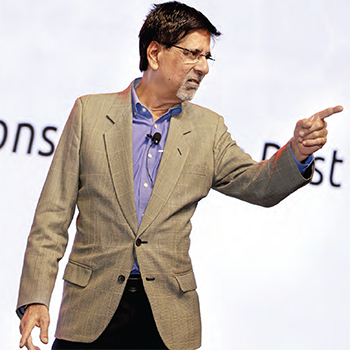
Burnout not only happens to cricketers; it happens to also you all sitting here. Actually burnout happens to most of them sitting in the offices. What’s happening is our mind is occupied with multiple things happening around us. Don’t forget that we as human beings, its just not the cricket or cricket bat. We also have a family, we also have other aspects in life and we sacrifice so much of our pleasures for getting some extra success or be special in life. Which you have to—if you want to be special, you will have to do some sacrifices. But, at the same time the burnout also happens when you overdo it. And, there will be a time where you will see that you don’t know what to do and you think of giving up. That’s why I say, when you are in such a situation, best is step back and watch. You yourself will understand, alright these are the mistakes that has happened.
In June 1983, I was a hero and in January 1984, I was zero. Again, in February 1984, I was minus five. Then I almost crossed minus ten, my form was so bad that they thought of dropping me. Then we went on a tour to Zimbabwe—I was vice-captain and Ravi Shastri was captain. My form was so bad that whatever I did I was getting out. The manager gave a report that this boy is not fit to play for India—imagine my situation. I come back to India, my father feels, “You played for India. You are happy you won the World Cup. You are done.” But, again I go by the same point—your deep-rooted desire, work on that consciously. My deep-rooted was always to prove myself in international cricket and my deep-rooted desire was to captain India. And, believe that from March 1984, exactly five years down the line, in 1989, I captained India. Because my deep-rooted desire was to captain India. I knew I will captain India one day and I did captain India. And I served as the Chairman of the BCCI Selection Committee in 2011. In my first interview on TV, question was asked, “How does India get back the world cup?” In the year 1983 we had won, and 28 long years we had not won. I said, "My dream is to bring the world cup in 2011." Again, my deep-rooted desire then was to win the world cup, as the chairman. With God’s grace we won the world cup. So, everything in life is interconnected, all energies are interconnected. Your self-belief, your team work, your deep-rooted desire, your positive energy, your negativity, everything is interconnected. So, if you are able to connect these dots energetically, using the right energy, we will get whatever we want.
Q: In 1983 in the finals, you faced the bowler, Joel Garner, who was one of the most feared bowlers in his playing days. What was your feeling as you faced him and did you have any plan?
That night—first of all I didn’t know what to do. Because, the truth is we were all amazed that we are in the final—I mean what more we can ask for—our first feeling was that. Before the match we thought that we will win—all of us were talking nonsense except for Kapil Dev. That bowler (Joel Garner) is already 6.8 feet and he jumps another three feet, which means when he bowls, that ball is delivered around 12 feet. I told Jimmy (Mohinder Amarnath), “I am not able to play this bowler, do you want to play?” He said, “Go and play your game, play Ada-Teda, what difference does it make.” I was told to hit-out-or-get-out.
Q: In sports its always about hard work, sweat, victory, defeat, which actually shows on the field. In todays context from leadership perspective, in sports there is lot of practice. But today people also want two-minutes noodles. So, what would be your key take from leadership point of view, in todays context?
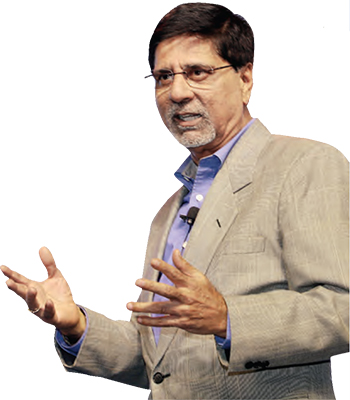
Firstly, I don’t eat two-minutes noodles. I don’t believe in this immediate solutions. Life is all about passion. The most important is whatever you do, do it with passion. And if you want to learn about passion, you should learn it from Sachin Tendulkar. That person, for 24 long years, has played cricket—imagine the kind of passion he has got. And, he has scored hundred centuries—do you think scoring it is easy. So, you need to have passion. So, when you want a two-minute noodle, that’s not passion, that is patch work. These immediate solutions is patch work and never do patch work. Find a permanent solution. Understand that whatever you do, find a solution and complete the circle.
Q: What is that motivates you to keep that spirit going on?
As I said, by nature I am an energetic person and when I tell others, well done or you are superb, anyone will get motivated and start bowling. So, the whole thing is about what does the person want. So, when you keep the touch, the touch of love, the touch of affection, the touch of care, you will see wonders. Which happens not only with your family, it happens with your team also.
About Kris Srikkanth
An engineer by profession, Krishnamachari Srikkanth, also known as Cheeka, is a former captain of the Indian cricket team and former chairman of the selection committee. He played a crucial part in India’s team batting line up as opener especially on the 1983 Cricket World Cup winning squad by contributing crucial 38 runs, as a top scorer in the finals against West Indies. He is known for his aggressive opening style and known to take risks even in the early part of the innings. He was made the captain of the Indian team in 1989. He played 43 Tests and 146 One-Day Inter- nationals for India. In the same year, Sachin Tendulkar made his debut under Srikkanth’s captaincy. He is also a motivational speaker and entrepreneur.